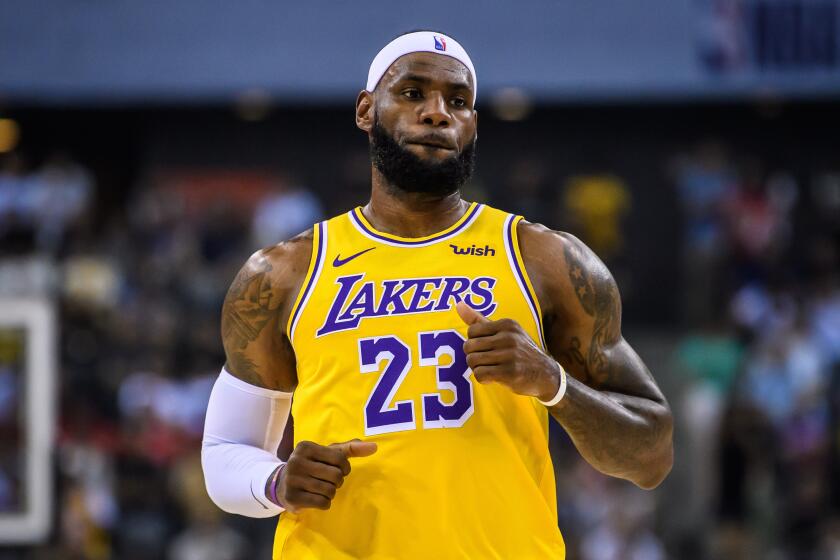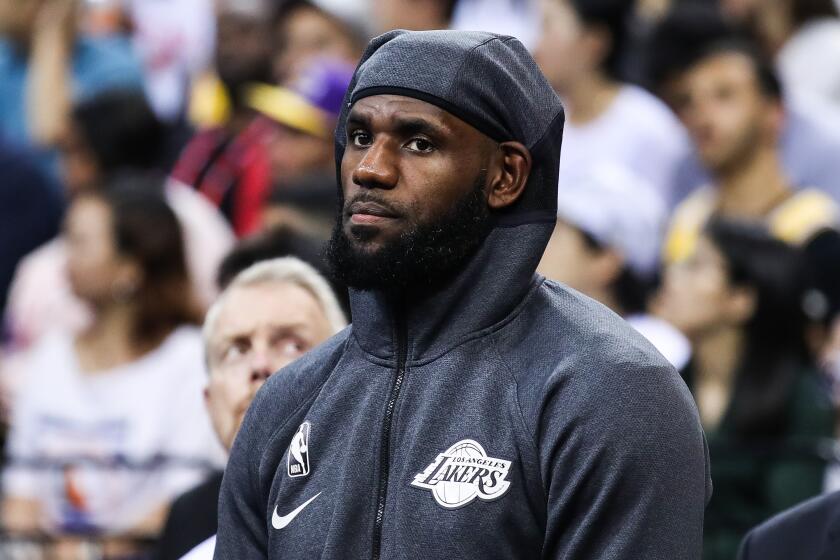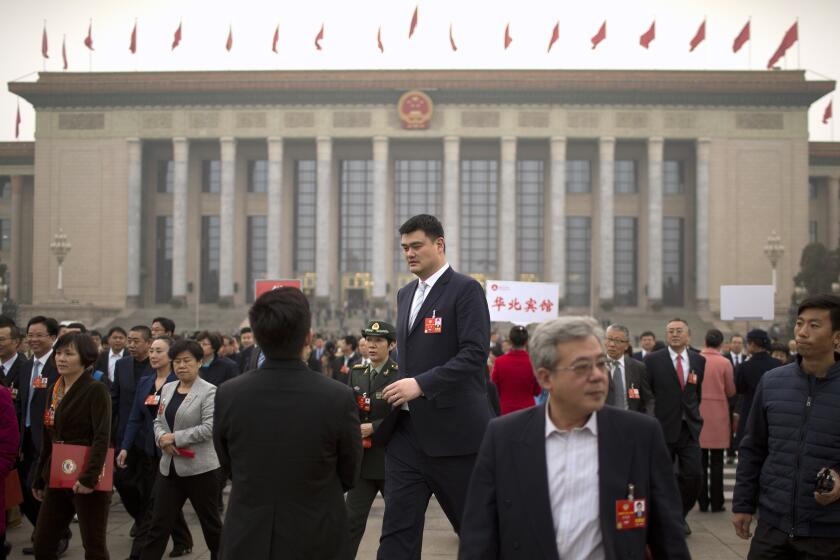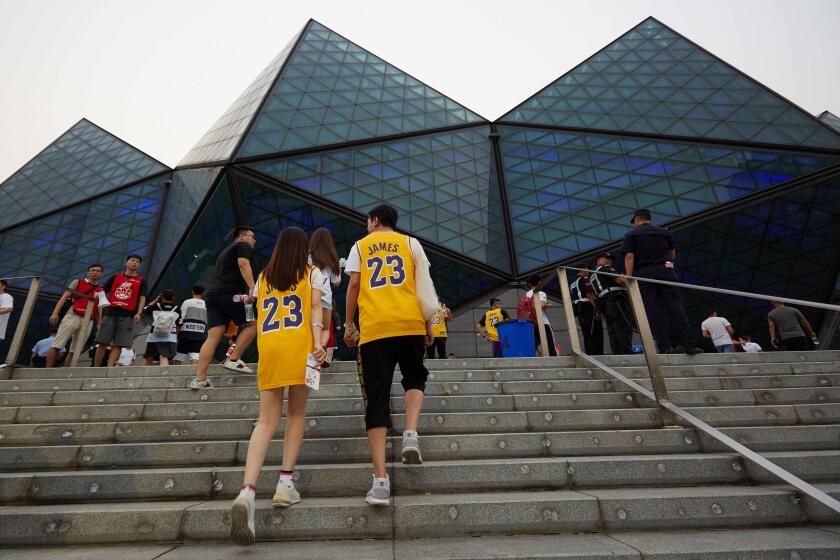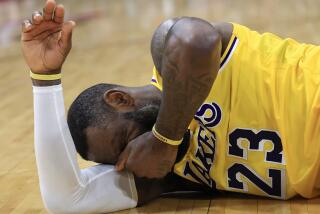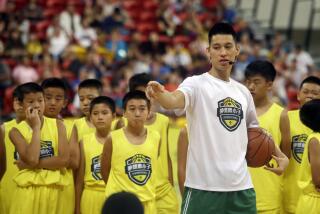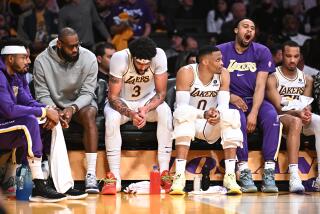Lakers in China: How the team and NBA navigated the crisis amid tumultuous week
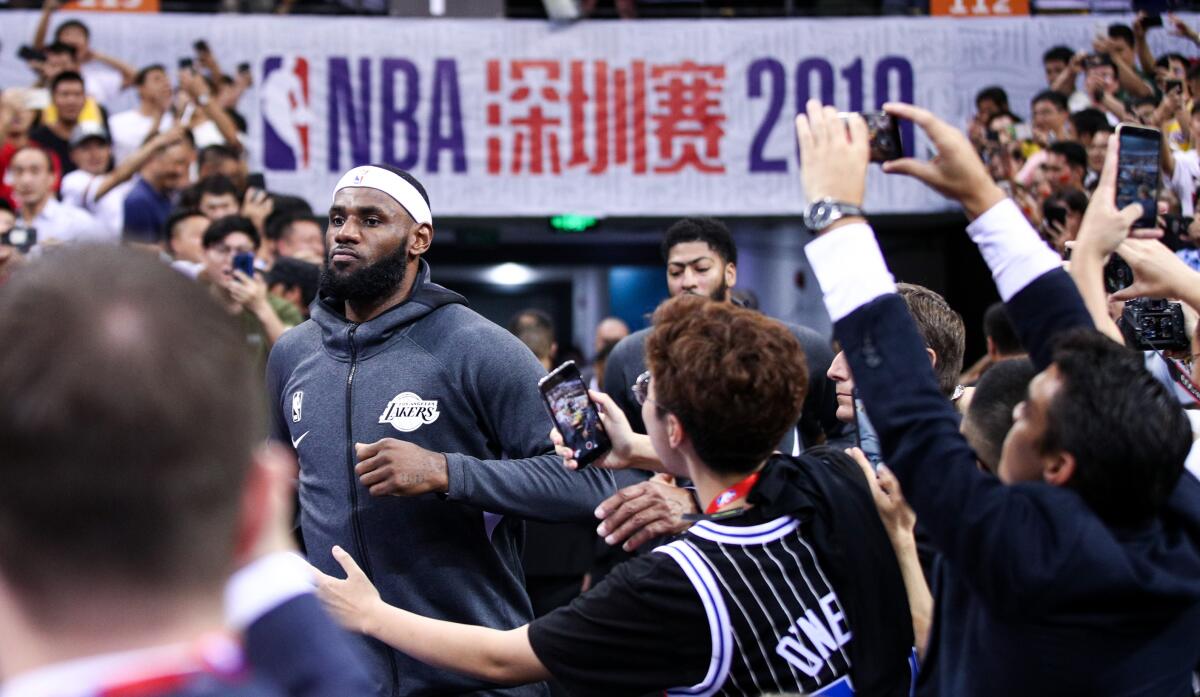
- Share via
Their first 24 hours in China were nothing like the Lakers or Brooklyn Nets expected.
Suddenly, the global politics NBA teams rarely think about had been thrust to the forefront of their daily lives. Sponsors canceled some scheduled events. The Chinese government canceled others.
When a charity event on Wednesday was nixed, the Lakers started to realize the seriousness of the situation.
Players didn’t know whether their conversations were truly private. They were on the ground in a country where the government does not tolerate dissent, the media is censored by the state and whose human rights record has drawn the ire of the United Nations, Amnesty International and Human Rights Watch.
Twitter and Google are blocked from the internet, dozens of surveillance cameras sit perched above every public street.
It was under these circumstances that NBA Commissioner Adam Silver and several league officials held a meeting with the Lakers, the Nets, executives from both teams and a representative from the NBA players’ union. Silver wanted to know how they felt.
During a tense week, only three media interviews occurred and all of them involved the Brooklyn Nets.
Starting Tuesday, no players, coaches, team or league executives conducted any on-the-record interviews. Several people with knowledge of the situation agreed to speak with The Times if their identities remained anonymous.
Here’s why the league was mostly silent in China and how the week unfolded.
::
The NBA is typically celebrated there. At the start of the week, posters adorned buildings all over Shanghai announcing the Lakers’ and Nets’ big visit. Nike made sure that in Shanghai, one is never too far from an image of LeBron James soaring through the air, or a sweatshirt about his journey from Akron, Ohio. Adidas covers its stores with Houston Rockets star James Harden.
Last week was no different.
LeBron James says Rockets general manager Daryl Morey didn’t consider the consequences of a tweet he sent out in support of the Hong Kong protests.
The trouble began when Rockets general manager Daryl Morey posted, “Fight for Freedom. Stand with Hong Kong,” on Twitter, supporting pro-democracy protesters in Hong Kong.
Hong Kong is a semi-autonomous region in China that was a British colony until 1997. Protesters are demanding greater police and government accountability as well as electoral reform so voters can choose their own representatives, in part because of China’s record on human rights. The government says the real issue is about national sovereignty.
Chinese companies quickly began distancing themselves from the NBA. Telecom corporation Tencent, which counts among its many arms a partnership with ESPN and the broadcasting rights to NBA games, canceled Rockets coverage and all NBA preseason broadcasts.
“It was different from the fact that from a basketball standpoint it felt like that wasn’t the No.1 thing,” said James on Monday, speaking for the first time since the trip to China began.
“Which it wasn’t. Obviously we all felt that and sensed that.”
Chinese officials informed NBA officials that they could not proceed with an NBA Cares event featuring the Nets that was scheduled for last Tuesday at a local elementary school. A news conference Tuesday in Tokyo heightened tensions.
Silver said the league would not apologize for Morey using his freedom of expression. That drew the ire of Chinese government officials and broadcasters.
“We must accuse the ‘Moreys’ who scheme to rake in money from China on one hand and hurt the Chinese people’s feelings on the other,” a broadcaster for CCTV, the state-run television channel, said later that day.
“This kind of two-faced behavior cannot succeed and must come with a price!”
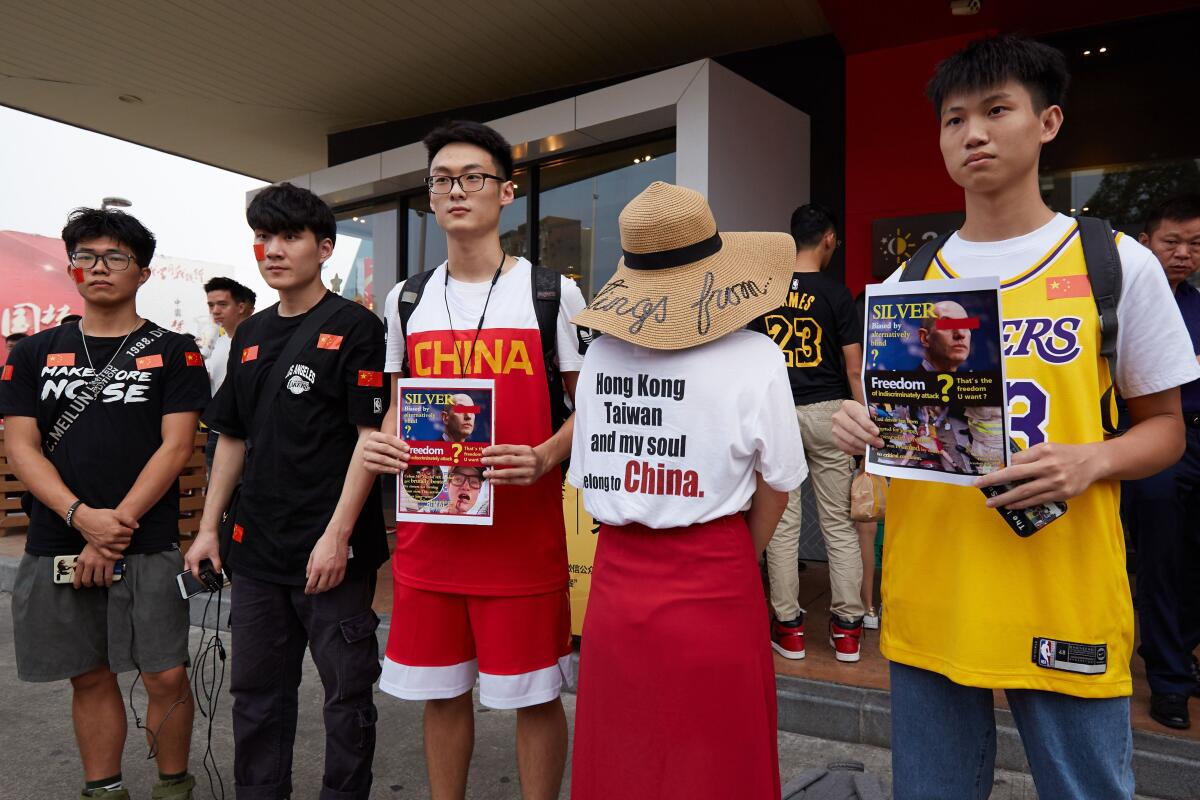
But what didn’t sound like an apology to Chinese officials sounded a lot like one to a bipartisan group of United States senators and representatives. They sent a letter to Silver on Wednesday rebuking him for “apologizing for Rockets General Manager Daryl Morey’s tweet.”
“Worse, your statements come at a time when we would hope to see Americans standing up and speaking out in defense of the rights of the people in Hong Kong,” the letter stated.
Behind the scenes, the league received calls from several American government officials, according to a person familiar with those discussions. Some offered support, some offered ideas for how to deal with their predicament. Others reached out to discuss relations between the United States and China.
The next day, Silver boarded a flight for Shanghai. He was joined by deputy commissioner Mark Tatum, president of social responsibility and player programs Kathy Behrens, chief communications officer Mike Bass and president of global content and media distribution Bill Koenig.
They settled into the plane, not knowing if they’d be allowed into the country.
The group landed in Shanghai a little after 1 p.m., as posters around the city were being torn down. Their entry into China was perfectly smooth.
The Nets and the Lakers had practiced earlier in the day at Mercedes-Benz Arena, where logos had been scrubbed to remove sponsor Vivo, a Chinese smartphone maker that had already announced it had suspended ties with the NBA.
Lakers star LeBron James is blaming Houston Rockets general manager Daryl Morey for hurting the NBA’s lucrative relationship with China.
That afternoon, Silver met with the teams as hundreds of media members waited downstairs. Players and executives from the Nets and Lakers were in the room, as were Silver, Tatum, Behrens, Bass and Chrysa Chin, the National Basketball Players Assn.’s executive vice president of strategy and development.
Players expressed their concerns to league officials about the situation, according to people familiar with the meeting. They wondered whether Morey would be disciplined, believing a player would if he had done the same thing.
James spoke up and said Silver should be on the front lines of any league communication with the media.
“I think it would have been very unfair for a kid like Talen Horton-Tucker, who is a 19-year-old rookie, to have to comment about such issues that he has absolutely nothing [to do with], that he has no knowledge about,” James said.
“And are we sure that he would have said, ‘Sorry guys, I have no idea what’s going on.’ Are we sure he would have said that? Or could have had said something that could have been detrimental to not only himself but for everyone that was there.”
A tweet from an NBA general manager supporting Hong Kong protests could threaten the league’s business in China — and how the NBA is perceived in the U.S.
There were moments of frustration when some players asked whether they could go home. If they said the wrong thing about Hong Kong or any other topic, would the Chinese government delay their flights home?
They asked questions about security and were given assurances they would be fine. They were asked to stay together, though. That meant dinners and lunches with just each other — bonding aided by geopolitical forces.
That afternoon, the league canceled that day’s media session. General manager Rob Pelinka became the Lakers’ point of contact with the league. James and Anthony Davis became his liaisons to the players.
They met in conference rooms at the Ritz Carlton Shanghai making sure to keep each other informed.
League officials, meanwhile, continued conversations with the Shanghai Sports Bureau, a government agency, attempting to soothe tensions and allow the game in Shanghai to be played.
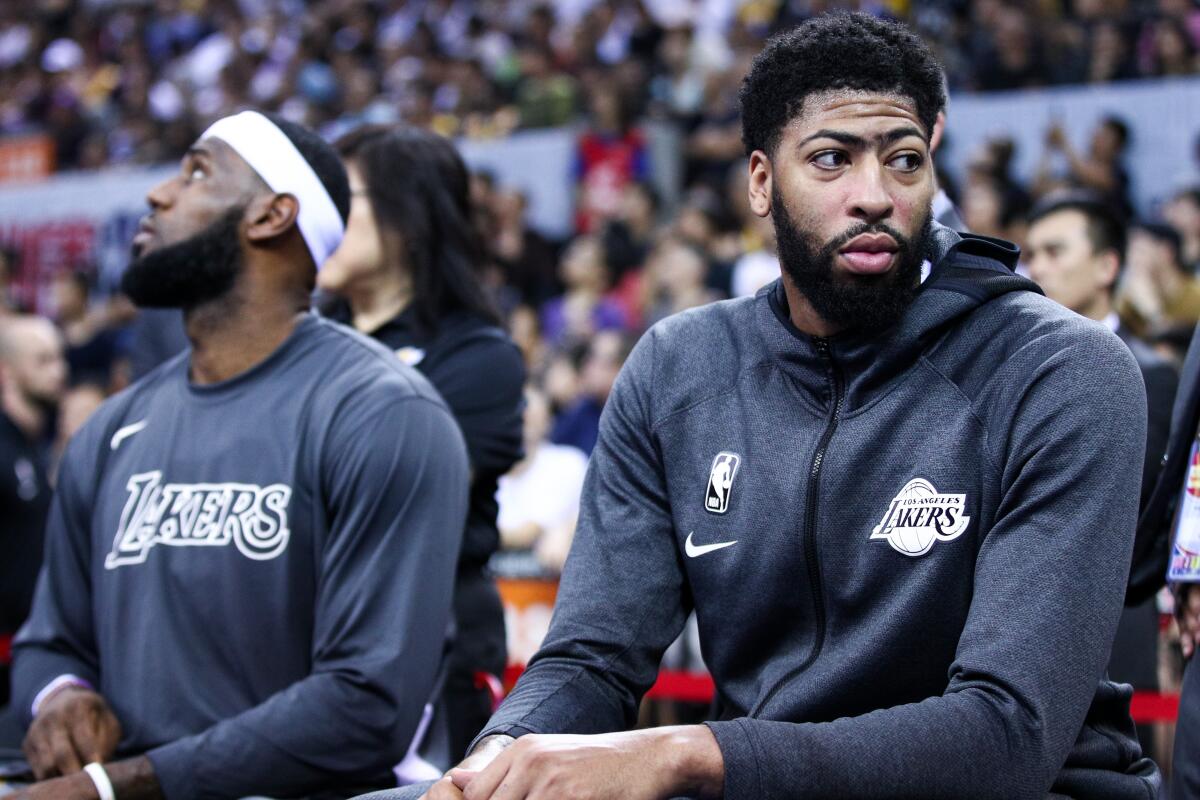
Silver never met with Yao Ming, the former Houston Rockets star who is now the president of the Chinese Basketball Assn., but one person familiar with their communications said they spoke at least 10 times a day.
The conflict personally affected Yao. At a wildly popular NBA exhibit in Beijing, all signs of the Houston Rockets were removed — including Yao’s jersey.
The Shanghai Sports Bureau canceled a fan event that was scheduled for Wednesday evening. They explained their logic to the NBA: Another controversy might have derailed the game, and they very much wanted it to happen.
The global scope of American-Chinese relations was part of the league’s calculus. Trade talks between China and the United States began on Thursday.
On Friday, President Trump agreed not to impose another tariff hike in exchange for China agreeing to buy $50 billion worth of American farm goods, according to the Associated Press.
While NBA officials worked with the government to secure the players’ safety, the mandate was given by China that there would be no media availability before the game. Silver had planned to speak but that was canceled too.
That, coupled with an incident in Japan led to questions about censorship of players. When a CNN reporter attempted to ask whether players still felt comfortable voicing their opinions, the Rockets’ communications director jumped in to say they were taking basketball questions only.
::
The game in Shanghai went smoothly and that helped when the Lakers and Nets traveled to Shenzhen. While league officials stayed in contact with Shenzhen government officials, their conversations didn’t need to be as thorough.
Around 4 p.m. Friday, the league announced there would not be media availability for the remainder of the trip. A league official also told reporters from The Times, ESPN and The Athletic that no restrictions had been placed on teams. If they wanted to, they could hold their own news conferences.
A Lakers representative said Saturday morning that was not true and directed questions back to the league. Later, questions about the discrepancy revealed that the Lakers didn’t consider whether to have their own sessions.
What Lakers executives thought would be an enjoyable cultural experience, instead became consumed by handling the crisis. Chief operating officer Tim Harris brought his young son for some bonding time. Team co-owner Joey Buss, who is also the chief executive officer of the South Bay Lakers, brought his wife on the trip, as did Pelinka.
It wasn’t until Saturday morning, that Pelinka got to explore outside the team hotel. He and his wife spent some time at a market, ate some noodles and got foot massages.
When athletes speak out on domestic issues of which they have first hand knowledge, such as an unjust criminal justice system, our government officials want them to stick to sports. So why do those same officials want to attack them for not speaking out on the protests in Hong Kong?
By then, there was a concerted effort from the NBA and the Chinese government to dial down the anger.
According to the New York Times, journalists at Chinese state-run newspapers were told not to write too much about the situation between China and the NBA, worrying that would draw too much attention to Hong Kong protests and possibly have a negative impact on the trade talks.
Tencent began broadcasting NBA preseason games again on Monday, without explanation. On the government-censored social media site Weibo, a person posted that someone attempted to bring a sign that said “HK belongs to China forever” to Shenzhen Universiade Center, but was “manhandled” by security and taken to a police station.
There were also reports on Weibo of Chinese flags being confiscated.
Saturday night’s game sold out. The Lakers lost by a wide margin, but James’ popularity ruled the night.
“I’ve always been welcomed with open arms,” James said.
“I’ve been to China maybe 15, 20 times. And the reason I’ve always wanted to go back to China is because of the game of basketball.”
The Lakers’ flight home did get delayed — but only because of a thunderstorm. Shortly after 3:30 a.m. local time, they began to taxi for takeoff. They landed in L.A. after 2 a.m. on Sunday, a crisis behind them.
More to Read
All things Lakers, all the time.
Get all the Lakers news you need in Dan Woike's weekly newsletter.
You may occasionally receive promotional content from the Los Angeles Times.
